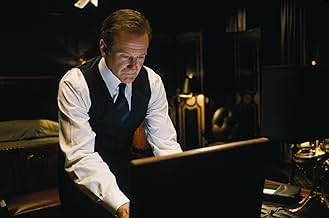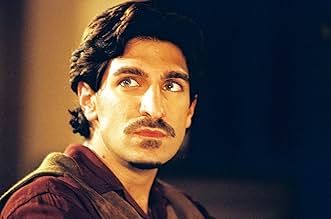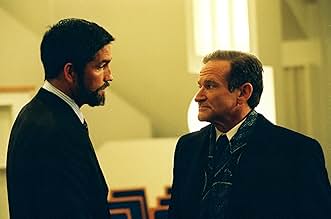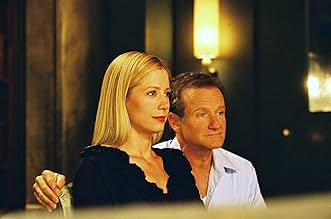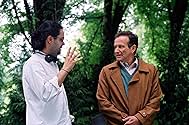ÉVALUATION IMDb
6,1/10
35 k
MA NOTE
Situé dans un monde avec des implants d'enregistrement de mémoire, Alan Hakman est un cutter, quelqu'un avec le pouvoir de modifier définitivement les histoires enregistrées des gens. Sa der... Tout lireSitué dans un monde avec des implants d'enregistrement de mémoire, Alan Hakman est un cutter, quelqu'un avec le pouvoir de modifier définitivement les histoires enregistrées des gens. Sa dernière mission est celle qui le met en danger.Situé dans un monde avec des implants d'enregistrement de mémoire, Alan Hakman est un cutter, quelqu'un avec le pouvoir de modifier définitivement les histoires enregistrées des gens. Sa dernière mission est celle qui le met en danger.
- Prix
- 1 victoire et 4 nominations au total
Tarek Bishara
- Hasan
- (as Thom Bishops)
Avis en vedette
In six words: great idea-not so great execution. In a slightly vague future, Robin Williams plays a video editor named Alan, his job is assembling 1-2 hour video portraits of deceased clients whose parent's were well off enough to have had them fitted (while still in the womb) with a "Zoe" implant. Named after the corporation that initially developed this device, the implant records (24-7) everything that happens to a person during their lifetime. It is important to the story that viewers understand that these are not memories but actual recordings. This distinction is critical to the plot as well as to one of the interesting questions posed by the film; to what extent have our actual memories been distorted by time.
The editors (called cutters) must distill down this lifetime of footage into a brief highlights video, discretely deleting scenes that would be offensive to the family of the decreased. This is not that different than the writers of obituary notices (see "Closer"). The video is shown at a special memorial service called a "rememory". To add some unnecessary complexity to the story there is a violent protest group who object to the whole concept. The basis of their objection is never adequately explained but seems to be centered on the fact that the footage is by necessity all from the person's own "point-of-view", with the protesters chanting "remember for yourself".
Of course a Cutter sees everything (mostly in fast motion) making him or her privy to a person's every secret and sin. In the film they briefly raise the most interesting question posed by this whole idea, if you knew that someone (be it man or God) would replay your entire life, to what extent would it change your behavior? In the film most (but not all) people with the implant are aware that they have it.
Knowing all this stuff makes Alan a lonely man. His philosophy: "The dead mean nothing to me, I took this job out of respect for the living", has caused him to avoid close interpersonal relationships, which might compromise the many confidences he is keeping. Within the closed community of cutters he is known as a "Sin Eater" because of his willingness to sanitize the lives of the scum of the earth, accepting clients that the other cutters reject. Williams looks even sadder and more depressed than in did in "What Dreams May Come". It is a extremely restrained performance, not especially challenging but perfectly suited to the mood of this film.
Alan gets in trouble when he takes on a project for a rich widow (Stephanie Romanov). Her husband knew a lot of corporate secrets and had been playing around with their young daughter. This "messing around with something much bigger" has a Raymond Chandler feel to it, and this fits nicely with what might be called a futuristic film noir production design.
Overall the many interesting ethical and philosophical questions raised by "The Final Cut" are more interesting than the film itself. In fact, there is so little real suspense and character identification that the viewing process is mostly an exercise in pulling yourself back from your contemplation of earlier scenes so that you can follow what is happening on the screen.
The film goes wrong by introducing a parallel story about Alan's childhood. While well handled, it fails in its purpose of explaining his adult motivations. By the end we care nothing about his character or his actions and are back to day dreaming about the many issues the film raises but does not adequately address.
Then again, what do I know? I'm only a child.
The editors (called cutters) must distill down this lifetime of footage into a brief highlights video, discretely deleting scenes that would be offensive to the family of the decreased. This is not that different than the writers of obituary notices (see "Closer"). The video is shown at a special memorial service called a "rememory". To add some unnecessary complexity to the story there is a violent protest group who object to the whole concept. The basis of their objection is never adequately explained but seems to be centered on the fact that the footage is by necessity all from the person's own "point-of-view", with the protesters chanting "remember for yourself".
Of course a Cutter sees everything (mostly in fast motion) making him or her privy to a person's every secret and sin. In the film they briefly raise the most interesting question posed by this whole idea, if you knew that someone (be it man or God) would replay your entire life, to what extent would it change your behavior? In the film most (but not all) people with the implant are aware that they have it.
Knowing all this stuff makes Alan a lonely man. His philosophy: "The dead mean nothing to me, I took this job out of respect for the living", has caused him to avoid close interpersonal relationships, which might compromise the many confidences he is keeping. Within the closed community of cutters he is known as a "Sin Eater" because of his willingness to sanitize the lives of the scum of the earth, accepting clients that the other cutters reject. Williams looks even sadder and more depressed than in did in "What Dreams May Come". It is a extremely restrained performance, not especially challenging but perfectly suited to the mood of this film.
Alan gets in trouble when he takes on a project for a rich widow (Stephanie Romanov). Her husband knew a lot of corporate secrets and had been playing around with their young daughter. This "messing around with something much bigger" has a Raymond Chandler feel to it, and this fits nicely with what might be called a futuristic film noir production design.
Overall the many interesting ethical and philosophical questions raised by "The Final Cut" are more interesting than the film itself. In fact, there is so little real suspense and character identification that the viewing process is mostly an exercise in pulling yourself back from your contemplation of earlier scenes so that you can follow what is happening on the screen.
The film goes wrong by introducing a parallel story about Alan's childhood. While well handled, it fails in its purpose of explaining his adult motivations. By the end we care nothing about his character or his actions and are back to day dreaming about the many issues the film raises but does not adequately address.
Then again, what do I know? I'm only a child.
It's the kind of film provoking many ethical questions about life, death, privacy and so on. Omar Naim's direction gives a glimpse into possible science discoveries and paths; its strong originality consists of showing how the state of civil rights could be threatened if these futuristic odyssey came true. The whole film is based on a steady premise, very solid performances and an impressive visual style, though special effects are not as special as one could think (given this title and this plot). Robin Williams is now accustomed to playing such frightening and alluring roles; after "Insomnia", "One hour photo" and this flick "Dead Poets Society" is now a far memory.
I have always been a Robin Williams fan. From watching him goof around in Mrs. Doubtfire when i was a kid to seeing him actually creep me out in One Hour Photo, probably his best movie to date. So i am willing to see anything he has to offer. I got a chance to see The Final Cut for free, so i took it. The plot seemed real interesting and it was a first. Later into the movie though, the plot was getting cut more than people's memories. Williams romance with Mira Sorvino (which was gag-worthy to begin with) doesn't have any closure, and the "cutting" procedure and the whole "chip in the brain" thing didn't seem too thought out. Robin Williams is good as always and he tries his best to keep you interested, and the opening of the movie was promising. I even think with a little work that director Omar Naim can make some really quality flicks. This one, however, seems like it was cut together from a better movie. Which is a shame because it was a really cool idea. 5/10
"The Final Cut" is a dark cross between "Eternal Sunshine of the Spotless Mind", "One-Hour Photo" and "Citizen Kane."
While this is an original screenplay by writer/director Omar Naim, it is faithful to a Philip Dick-type imagining of a techno-world in the not-so-distant future, with the bleakness, of both the excellent production design, cinematography, music and the story, only briefly mitigated.
I like how gradually we see the explanations and issues of memories from many different view points and issues, while one lives and dreams and how one lives on in other people's memories, as a multiplier effect in touching other people and our own souls.
Just as the interviews of family recall the journalist trying to understand Kane, the fine scene is a nice visual play on his famous mystifying "Rosebud," ironically demonstrating that someone outside one's head can never understand what is significant and meaningful to an individual, what goes into making that unique personality.
While I'm not sure it's such a bombshell that eulogies --in this case as visually edited "re-memories" culled from brain implants--are whitewashes (as pointedly satirized by Tom Wolfe in "Bonfire of the Vanities") and the political protesters seemed almost to be satirically out of a T. C. Boyle novel, James Caviezel's seriousness keeps them out of Unabomber territory.
One awkward miscast is Mira Sorvino. As if it's not already obvious why a Robin Williams would be attracted to a blonde bombshell, another layer of motivation is added, but it just makes absolutely no sense why she was drawn to him. Not only does this seem yet another instance of film's older man/younger woman tendencies, the character would have made a lot more sense as an older woman with a past.
The effective multiple screens showing the editing of "re-memories" may be difficult to distinguish on the eventual DVD, but I wasn't sure if the blown-up look was from projection issues.
While this is an original screenplay by writer/director Omar Naim, it is faithful to a Philip Dick-type imagining of a techno-world in the not-so-distant future, with the bleakness, of both the excellent production design, cinematography, music and the story, only briefly mitigated.
I like how gradually we see the explanations and issues of memories from many different view points and issues, while one lives and dreams and how one lives on in other people's memories, as a multiplier effect in touching other people and our own souls.
Just as the interviews of family recall the journalist trying to understand Kane, the fine scene is a nice visual play on his famous mystifying "Rosebud," ironically demonstrating that someone outside one's head can never understand what is significant and meaningful to an individual, what goes into making that unique personality.
While I'm not sure it's such a bombshell that eulogies --in this case as visually edited "re-memories" culled from brain implants--are whitewashes (as pointedly satirized by Tom Wolfe in "Bonfire of the Vanities") and the political protesters seemed almost to be satirically out of a T. C. Boyle novel, James Caviezel's seriousness keeps them out of Unabomber territory.
One awkward miscast is Mira Sorvino. As if it's not already obvious why a Robin Williams would be attracted to a blonde bombshell, another layer of motivation is added, but it just makes absolutely no sense why she was drawn to him. Not only does this seem yet another instance of film's older man/younger woman tendencies, the character would have made a lot more sense as an older woman with a past.
The effective multiple screens showing the editing of "re-memories" may be difficult to distinguish on the eventual DVD, but I wasn't sure if the blown-up look was from projection issues.
Well, I just saw The Final Cut over the weekend and I am finding myself very disappointed in the movie. From the previews I had imagined something a little different with a lot more action that what took place. There were certain scenes that I felt were good and like them, but all in all I would rather have waited to just rent the movie than to have gone to see it in the theaters. It was a pretty slow moving movie when I was expecting more suspense and action. Robin Williams did a great job in the part, just to clarify. Once again, it was just my view of the movie as a whole that I did not like. The overall plot was good and the storyline had a great theme but as I watched, I just became more and more disappointed. Then at the end, it just kind of ended. To me, I was left with the feeling that there should have been more than just a sudden ending like it had.
Le saviez-vous
- AnecdotesThe Zoe implant records all visual experiences in a person's life. In Greek, Zoe means "life".
- GaffesThe paper announcing Bannister's death states that he was 54 when he died. But, when Alan loads his implant for the first time, it states that there are 544,628 life hours to review. That number of hours would make him over 62 years of age.
- Bandes originales4 Seasons/Spring
(1725)
Written and Composed by Antonio Vivaldi (as Vivaldi)
Performed by Royal Philharmonic Orchestra (as The Royal Philharmonic)
Published by Extreme Music Library PLC
Courtesy of Extreme Production Music
Meilleurs choix
Connectez-vous pour évaluer et surveiller les recommandations personnalisées
- How long is The Final Cut?Propulsé par Alexa
Détails
- Date de sortie
- Pays d’origine
- Site officiel
- Langue
- Aussi connu sous le nom de
- Más allá de la muerte
- Lieux de tournage
- sociétés de production
- Consultez plus de crédits d'entreprise sur IMDbPro
Box-office
- Brut – États-Unis et Canada
- 551 281 $ US
- Fin de semaine d'ouverture – États-Unis et Canada
- 226 296 $ US
- 17 oct. 2004
- Brut – à l'échelle mondiale
- 3 222 439 $ US
- Durée
- 1h 35m(95 min)
- Couleur
- Mixage
- Rapport de forme
- 2.35 : 1
Contribuer à cette page
Suggérer une modification ou ajouter du contenu manquant


